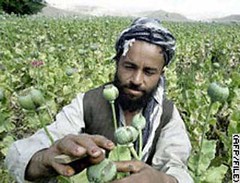
Poppy Cultivation is Flourishing Under US/NATO Occupation of Afghanistan
Originally uploaded by Pan-African News Wire Photo File
Books of The Times
Afghan Struggle to Change Poppy Fields Into Roads
By WILLIAM GRIMES
OPIUM SEASON: A Year on the Afghan Frontier
By Joel Hafvenstein
Joel Hafvenstein returned to Afghanistan in late 2004 armed with nothing but good intentions. Employed by Chemonics, a private company with a contract from the United States Agency for International Development, he was part of a team trying to discourage cultivation of the opium poppy by providing an alternative income for poor farmers.
Within months the mission was in disarray, its American workers huddled in a fortified bunker after eight of its Afghan employees had been murdered. The next year’s poppy harvest would be the largest on record.
The sobering dispatches in “Opium Season,” a wrenching account of lofty hopes and bitter disappointments, shed a dismal light on American efforts to improve the lot of ordinary Afghans. All over the country development projects are under way aimed at winning over the Afghan people, depriving the Taliban of popular support and propping up Hamid Karzai’s government. The obstacles are as steep as the surrounding mountains, as Mr. Hafvenstein discovered and ruefully recounts in this bitter but affectionate book about his three stints in Afghanistan from October 2003 to May 2005.
In Helmand Province, where Mr. Hafvenstein had his final tour of duty, the immediate plan was simple: hire local people for big public-works projects and put money in their pockets before the government started cutting down profitable poppy fields. This stopgap effort would be the prelude to large-scale infrastructure projects that would lift the local economy permanently. Easier said than done.
Getting a multimillion-dollar project up and running plunged Mr. Hafvenstein and his co-workers into a social, political and economic morass that eventually sucked them under. In a country with scant resources, every dollar shifted the local balance of power in unforeseen ways.
The influx of international development companies distorted the Afghan economy, driving up the cost of housing and drawing educated Afghans away from vital but poorly paid jobs in, for example, education. Local power brokers, whether government officials or tribal leaders, eyed the Americans askance, worried that their own influence might be diminished. Big landowners schemed to steer benefits in their direction.
Mr. Hafvenstein arrived eager but unprepared in a region known to the ancient Persians as “the land of the unruly.” Racing to set up a project office, he interviewed a long line of Afghans with spotty qualifications and modest expectations. One stated on his application that he looked forward to working in “a mullet-cultural environment.” Another, hesitant to accept a job that required him to travel with payroll money, said, “I would like a job where I will not be killed.”
The security situation was indeed tenuous. Early on Mr. Hafvenstein got a cold dose of reality when the company’s security officer rattled off a list of must-buy items for the offices. These included blast film for the windows, razor wires for the walls and a windowless safe room lined with sandbags “if things get ugly.” Nevertheless, before safes arrived, Mr. Hafvenstein carried around bricks of American, Afghan and Pakistani currency in the inside pockets of his waistcoat.
The cash-for-work program showed progress. Chemonics hired thousands of laborers to do roadwork or dig out the silt from canals in a huge irrigation system built in the 1940s by Morrison-Knudsen, the engineering company that built the Hoover Dam and the San Francisco Bay Bridge. Spurred on by an energetic, idealistic Afghan-American in the office, the company made every effort to extend its reach to remote valleys badly in need of development aid.
But the hard realities of the poppy economy quickly reasserted themselves. The local government would plow under the poppy fields belonging to poor farmers just enough to mollify the central government, while powerful landlords paid the police to pass them by. After a particularly heavy rain in Lashkargah, the provincial capital, Mr. Hafvenstein noticed a thriving poppy field directly across the street from the American military outpost, its existence revealed by a collapsed section of earthen wall.
Everyone in Helmand, directly or indirectly, depended on poppy income, including top officials. In June 2005 police raided the mansion of Helmand’s governor, Sher Muhammad Akhundzada, and found nine metric tons of opium. Mr. Akhundzada, who enjoys close family ties to Mr. Karzai, explained that he had seized the opium from traffickers and was merely waiting for the appropriate moment to dispose of it.
Mr. Hafvenstein and his team disturbed the status quo, although they were never clear precisely when or how. When several workers were victimized by a carjacking, informants blamed common thieves, but the act might have been retaliation for giving too many jobs to members of the wrong clan. Later, in the same area, two Afghan workers were ambushed and killed. A party that set out the following day to transport the dead bodies to a cemetery in Kabul was also ambushed and its members executed. One man, an ethnic Hazara (member of the Shiite minority) was shot through the eyes.
Local leaders blamed the Taliban. But the killings might have been ordered by poppy growers angry that the American project was depriving them of badly needed labor for the harvest. The police showed little enthusiasm for investigating the matter.
That was it for Mr. Hafvenstein and his American colleagues. They headed home, sadder and wiser. “We had come to Helmand thinking of opium as the local currency, and had tried to replace it with cash,” Mr. Hafvenstein writes. “But security was the real currency of Afghanistan. The traumatized population of Helmand would trade anything for it, follow anyone who could offer it.”
In a country where violence trumps money every time, the United States, Mr. Hafvenstein suggests, will have to work out a different equation.
No comments:
Post a Comment